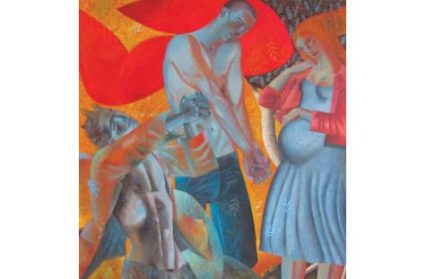Jon Gower reviews The Battle to the Weak by Hilda Vaughan, a love story set in mid-Wales which was first published in 1925.
The twentieth century novel has seemingly been somewhat neglectful of mid-Wales, but the publication of Hilda Vaughan’s Radnorshire-set tale of love on the land The Battle to the Weak, first published in 1925, goes some way towards redressing the imbalance. It also helps bring this sorely, almost totally neglected writer, entirely ripe for re-evaluation, back into the light.
In the introduction the novelist Fflur Dafydd freely admits she’d not heard of the Builth Wells-born writer until she was asked to write something, and I have to declare the same ignorance. But how glad I am to have done the same! Set against a vivid, clearly drawn, backdrop of traditional agricultural life, this is a gripping, if quietly redacted tale, with a strong cast of characters arrayed across the full spectrum, from the dastardly and despicable to the delightful. It is Hilda Vaughan’s first novel, of a total of eleven, but you’d scarcely credit it, what with the dash with which she brings her characters to life, and the way she imbues them with very human qualities, the energetic narrative and the sense of a sparsely populated agricultural community fully described.
Sitting squarely in the first category is John Bevan, the dipsomaniacal and ferociously ill-tempered father of the book’s heroine, Esther who belongs very firmly in the second.
John Bevan suppurates with anger for much of the novel, lashing out, often hurting people – and really hurting people – and it isn’t until his health breaks that he calms down a tad and only then, one feels, because he’s run out of spleen. He’s a gloriously monstrous and ignorant creation, always red faced but never because of shame.
His daughter, Esther, on the other hand is just naturally and bounteously attractive, so it’s little wonder, then, that the bookish Rhys Lloyd, an ardent Social Darwinist, is drawn to her. She finds plenty to attract her, in turn, as evidenced by their first moonlit walk together when ‘Esther, listening to the talk of the strange youth beside her, wondered whether she were awake or dreaming, so unreal did everything appear.’ Rhys’s conversation, or maybe monologue, is pretty capacious:
He talked of the ‘golden age’ of Wales, of poetry and harp-playing, royal hospitality and chivalrous love… But to his silent listener his talk was one with the magic of the night. Strange memories, not of her own, but of her race’s past, began to stir in her. A thousand starlit love-makings that had gone to her creation haunted her as had the sweet sadness of the singing an hour ago.
But their growing love is not allowed to flourish and Rhys Lloyd moves away, leaving Esther to nursemaid her family and nurse her regrets, in a brutishly simple household where Iago Prytherch himself could easily fit in, gobbing aimlessly into the stuttering fire.
The theme of thwarted romance, of Esther doomed to pine emptily for her faraway love, sits near the quietly, expectantly beating heart of this work. It is also a novel rich in country atmosphere, from the ‘musty smell of wet corduroys’ through the church- and chapel-bound streams of black-clad men and women’ to the lucidly-drawn landscapes, such as the upper slopes of the hillside which ‘became visible like the sea coast of an island itself half-submerged, and the higher patches of lightness admitted a dominant blue from the sky.’ A house is like ‘a button mushroom with snowy top and flesh-coloured stem.’ And of course, this being mid-Wales, there are sheep, which were ‘born, weaned, sheared, mated, sold and slaughtered,’ and a dwindling countryside workforce to tend such animals. And it’s a time of other changes, too, as the train makes an appearance, cutting through the fields in a cloud of red steam, pulling its cargo called technological change.
The Battle to the Weak is coupled to another tale of thwarted love in the shape of the novella A Thing of Nought, which again depicts the destinies of lovers parted by circumstance and separated by great distance. It makes a fitting and appropriate companion piece to a novel which fully deserves its place on the growing shelf of the Library of Wales. Don’t look here for Hollywood endings, but rather honest outcomes to tested lives.
Jon Gower is an author and regular contributor to Wales Arts Review.











